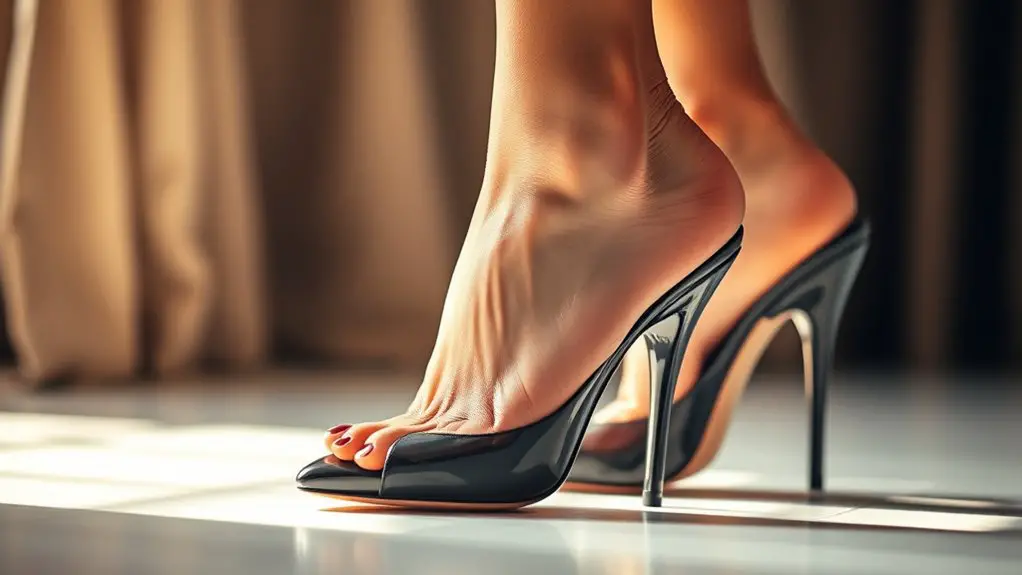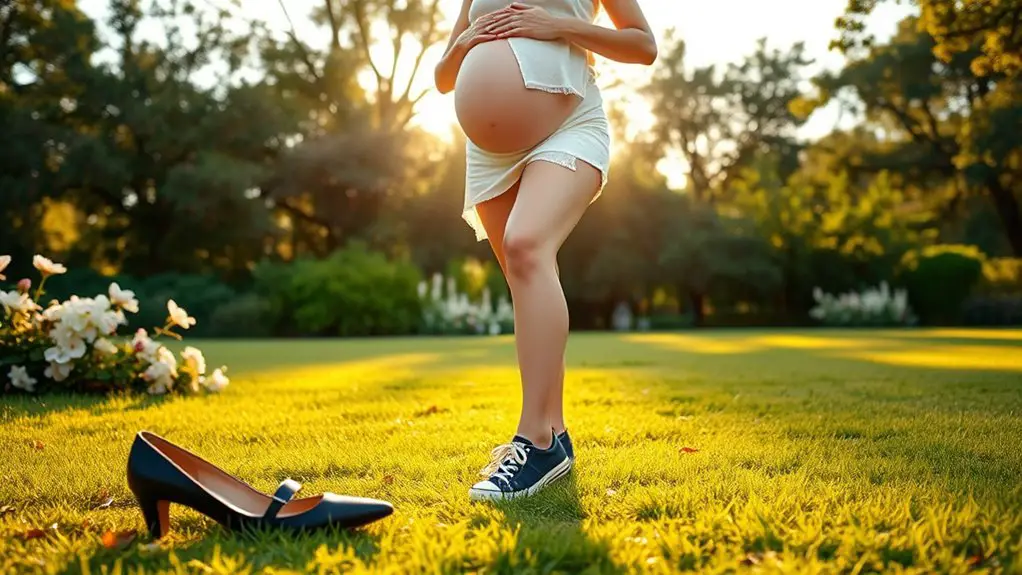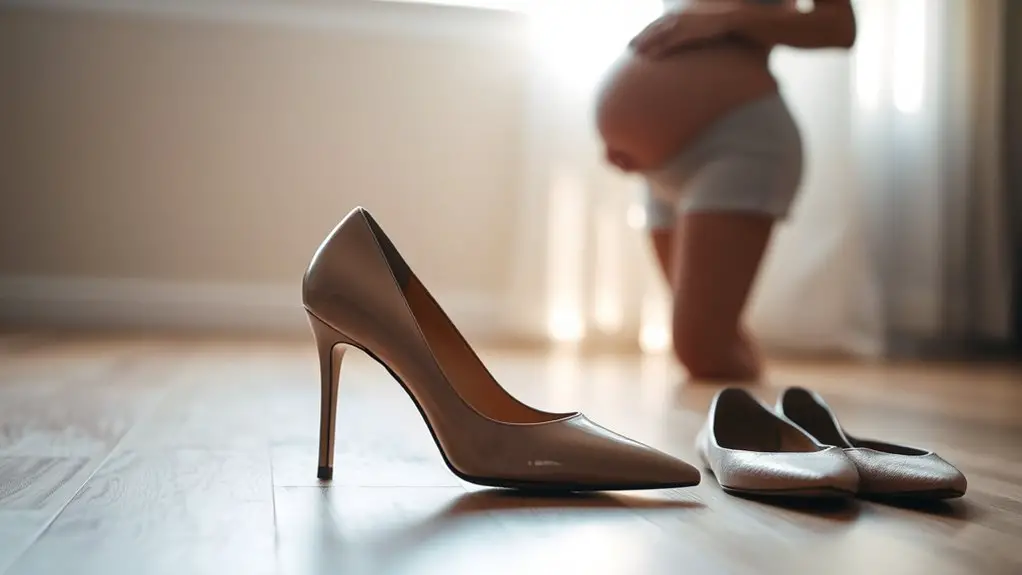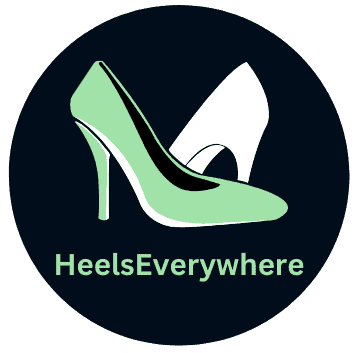High heels aren’t safe for pregnant women due to increased risks of falls and discomfort. As pregnancy progresses, hormonal changes cause foot structure alterations, leading to swelling and instability. Wearing high heels can worsen these issues, increasing the likelihood of ankle injuries and chronic pain. It’s essential to prioritize comfort and stability during this time. Choosing the right footwear can help support your changing body. There’s more to explore regarding safe and comfortable footwear options.
The Impact of Pregnancy on Foot Structure

As you navigate through pregnancy, you might notice changes in your foot structure that can impact your overall comfort and mobility. One significant alteration involves the foot arch. Hormonal changes lead to increased laxity in ligaments, which can cause the arch to flatten, resulting in a wider foot. This shift may contribute to discomfort, particularly as your body weight increases.
Additionally, swelling effects are common during pregnancy due to fluid retention and increased blood volume. This swelling can exacerbate any changes in foot shape, making it difficult to wear pre-pregnancy footwear comfortably.
It’s essential to choose supportive shoes that accommodate these changes. Consider footwear with arch support and cushioning to alleviate discomfort. Monitoring your foot health throughout pregnancy can help you manage these changes effectively, ensuring you maintain mobility and comfort as you prepare for the arrival of your baby.
Risks Associated With Wearing High Heels
Wearing high heels during pregnancy can greatly increase your risk of falls due to altered balance and stability. Additionally, you may experience foot and back pain as your body adapts to the physical changes associated with pregnancy. It’s important to take into account these risks when choosing footwear during this critical time.
Increased Fall Risk
How does the elevation of high heels compromise stability during pregnancy? Wearing high heels can notably increase your fall risk due to altered balance and center of gravity. As your body changes, the added height from heels reduces your footwear flexibility, making it harder to adapt to uneven surfaces. This lack of adaptability can lead to slips and falls, which are especially concerning during pregnancy. Engaging in balance training might help improve stability, but it can’t fully mitigate the risks associated with high heels. The combination of physical changes and the restrictive nature of high heels creates an unsafe environment. Consequently, it’s essential to evaluate safer footwear options to protect yourself and your unborn child from potential injury.
Foot and Back Pain
High heels can contribute to significant foot and back pain during pregnancy, affecting your overall comfort and mobility. The changes in your body can exacerbate these issues, making it vital to evaluate the risks. Here are some common pain-related concerns:
- Increased Pressure: High heels shift your weight forward, putting extra stress on your feet and lower back.
- Poor Posture: Wearing heels can lead to misalignment, which may cause chronic back pain.
- Limited Foot Mobility: This footwear can restrict natural foot movement, making it harder to perform essential foot exercises that promote pain relief.
To mitigate these issues, think about using supportive footwear and prioritize foot exercises to strengthen your muscles and alleviate discomfort.
Benefits of Choosing Comfortable Footwear

Choosing comfortable footwear during pregnancy offers enhanced stability and support, which is essential as your body undergoes considerable changes. This type of footwear can also reduce the risk of injury, helping you navigate daily activities with greater ease and confidence. Prioritizing comfort can greatly impact your overall well-being during this important time.
Enhanced Stability and Support
Although pregnancy brings numerous changes to your body, selecting comfortable footwear can greatly enhance stability and support during this time. By prioritizing supportive footwear, you can help maintain balance and reduce discomfort. Consider these benefits:
- Improved Balance: Supportive shoes can aid in maintaining your center of gravity, especially as your belly grows.
- Reduced Strain: Proper footwear minimizes stress on your feet and joints, allowing you to perform daily activities more comfortably.
- Enhanced Mobility: Comfortable shoes facilitate balance exercises, promoting strength and coordination as your body adapts to its new shape.
Investing in quality footwear is essential for your well-being during pregnancy. Remember, every step counts, and the right shoes can make a significant difference in your stability and overall comfort.
Reduced Risk of Injury
When pregnant, wearing comfortable footwear is essential for minimizing the risk of injury. Choosing the right footwear can greatly impact your stability and balance, which are often compromised during pregnancy. High heels can increase the likelihood of falls, while supportive shoes provide better grip and cushioning, promoting injury prevention. Opting for flat, well-fitting shoes can alleviate pressure on your joints and reduce fatigue, allowing for better mobility. Additionally, appropriate footwear choices can help manage conditions like swelling or plantar fasciitis, common during pregnancy. By prioritizing comfort and support, you not only protect yourself from potential injuries but also enhance your overall well-being during this critical time. Remember, your safety is paramount for you and your baby.
Alternatives to High Heels During Pregnancy
While high heels may be a staple in many wardrobes, finding suitable alternatives during pregnancy is essential for maintaining comfort and stability. As your body undergoes numerous changes, your footwear should prioritize support. Here are three alternatives to evaluate:
Finding the right footwear during pregnancy is crucial for comfort and support as your body changes.
- Comfortable Sandals: Look for sandals with cushioned soles and adjustable straps to provide breathability and support.
- Supportive Flats: Choose flats with arch support and flexible materials. They can help alleviate pressure on your feet while maintaining a stylish appearance.
- Athletic Shoes: Opt for well-fitted athletic shoes with good shock absorption. They can provide excellent support and stability, especially if you’re on your feet for extended periods.
These options can help reduce discomfort and minimize the risk of injury, allowing you to enjoy your pregnancy while keeping your feet healthy and supported.
Expert Recommendations for Footwear Choices

Consulting with experts can provide valuable insights into choosing the right footwear during pregnancy. It’s essential to prioritize comfort and stability as your body undergoes significant changes. Experts recommend avoiding high heels, as they can increase the risk of falls and strain on your joints. Instead, consider footwear trends that emphasize support, such as flats or low-heeled shoes with cushioning.
Opt for pregnancy styles that feature adjustable straps or elastic materials, allowing for foot swelling. Look for shoes with a wide toe box to accommodate changes in foot size and shape. Additionally, consider slip-resistant soles to enhance safety.
While it’s tempting to follow fashion trends, remember that your well-being is paramount. Prioritizing supportive and comfortable footwear can help you navigate this transformative period with greater ease and confidence. Always consult with your healthcare provider for personalized recommendations tailored to your specific needs.
Personal Experiences and Testimonials From Expectant Mothers
Many expectant mothers have shared their experiences regarding the challenges of choosing the right footwear during pregnancy. Their personal stories highlight the importance of comfort and safety, especially when it comes to high heels. Here are three common themes from mother testimonials:
- Balance Concerns: Many women reported feeling less stable on their feet, leading them to abandon high heels for more supportive options.
- Foot Swelling: Expectant mothers noted that their feet often swelled, making high heels uncomfortable and impractical.
- Style vs. Safety: While some mothers expressed a desire to maintain their style, they ultimately prioritized safety and comfort for their well-being and that of their baby.
These testimonials serve as a cautionary reminder that while high heels may be stylish, the physical changes during pregnancy often necessitate a more practical approach to footwear.
Frequently Asked Questions
Can Wearing High Heels Affect My Baby’s Development?
Wearing high heels can impact your balance and stability, potentially affecting your overall health during pregnancy. While there’s no direct evidence linking heel safety to baby health, cautious footwear choices are advisable for ideal well-being.
How Do High Heels Impact Balance During Pregnancy?
Wearing high heels can exacerbate balance challenges during pregnancy, increasing the risk of falls. It’s advisable to contemplate more supportive footwear alternatives to guarantee stability and minimize potential injury while your body undergoes significant changes.
Are There Specific Heel Heights That Are Safer?
When considering heel height recommendations, it’s best to opt for lower heels, ideally under two inches. Safer shoe options, like flats or supportive footwear, can enhance stability and comfort, reducing risk of falls during pregnancy.
Can I Wear High Heels for Special Occasions?
For special occasions, you might consider wearing high heels, but it’s wise to evaluate comfort and stability. Exploring heel alternatives, like stylish flats or lower wedges, can provide elegance without compromising safety during your event.
What Should I Do if My Feet Hurt in Heels?
Oh, the joys of high heels! If your feet hurt, consider foot care first. Try alternative footwear, like comfy flats, to relieve pressure. Your feet deserve a break from those stylish torturers, don’t they?
